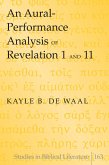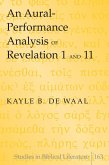The imperative mood as a whole has generally been neglected by Greek grammarians. The Greek Imperative Mood in the New Testament: A Cognitive and Communicative Approach utilizes insights from modern linguistics and communication theory in order to propose an inherent (semantic) meaning for the mood and describe the way in which it is used in the New Testament (pragmatics). A linguistic theory called neuro-cognitive stratificational linguistics is used to help isolate the morphological imperative mood and focus on addressing issues directly related to this area, while principles from a communication theory called relevance theory provide a theoretical basis for describing the usages of the mood. This book also includes a survey of New Testament and select linguistic approaches to the imperative mood and proposes that the imperative mood is volitional-directive and should be classified in a multidimensional manner. Each imperative should be classified according to force, which participant (speaker or hearer) benefits from the fulfillment of the imperative, and where the imperative falls within the event sequence of the action described in the utterance. In this context, sociological factors such as the rank of participants and level of politeness are discussed together with other pragmatic-related information. The Greek Imperative Mood in the New Testament is a valuable teaching tool for intermediate and advanced Greek classes.
Dieser Download kann aus rechtlichen Gründen nur mit Rechnungsadresse in A, B, BG, CY, CZ, D, DK, EW, E, FIN, F, GR, HR, H, IRL, I, LT, L, LR, M, NL, PL, P, R, S, SLO, SK ausgeliefert werden.









